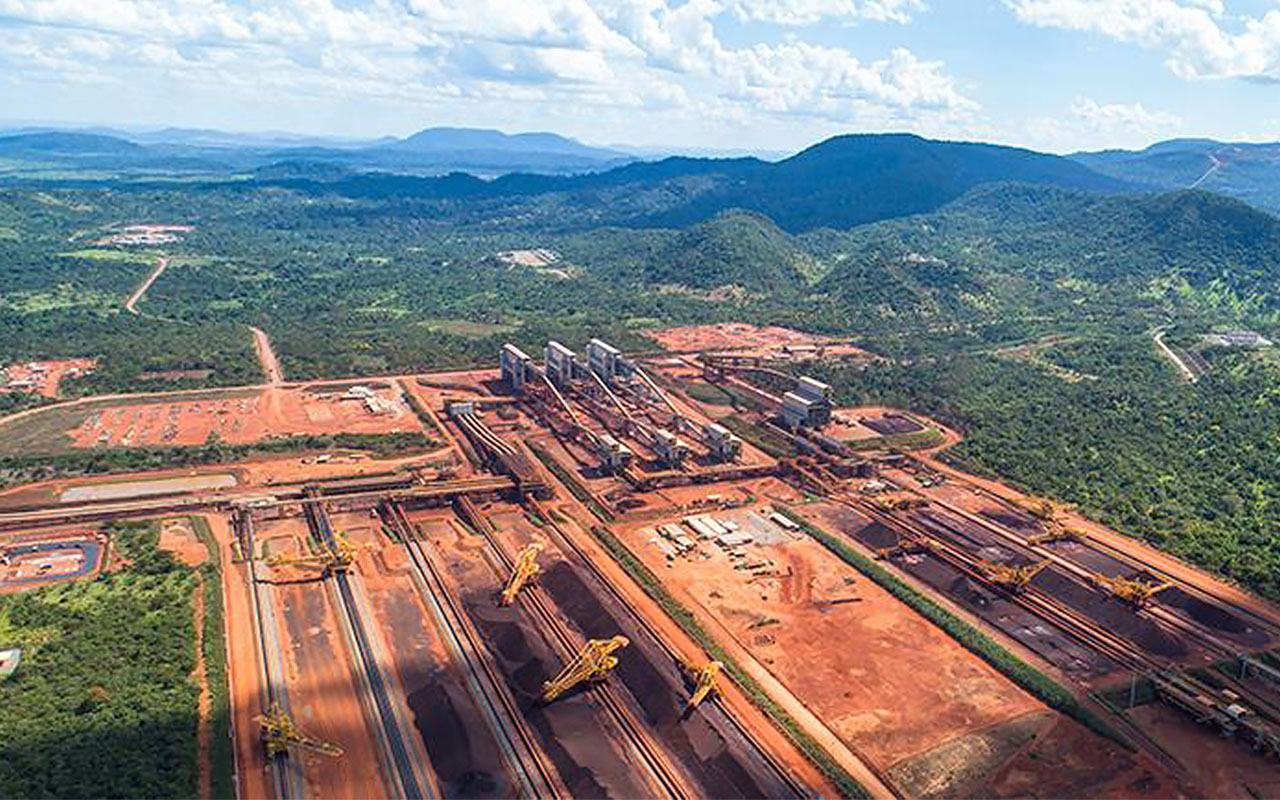7 Latin American Stocks to Buy for the Long-Term
Latin American stocks might not be the most stable holdings on the planet – but that’s just fine if you’re an aggressive investor.


Profit and prosper with the best of Kiplinger's advice on investing, taxes, retirement, personal finance and much more. Delivered daily. Enter your email in the box and click Sign Me Up.
You are now subscribed
Your newsletter sign-up was successful
Want to add more newsletters?

Delivered daily
Kiplinger Today
Profit and prosper with the best of Kiplinger's advice on investing, taxes, retirement, personal finance and much more delivered daily. Smart money moves start here.

Sent five days a week
Kiplinger A Step Ahead
Get practical help to make better financial decisions in your everyday life, from spending to savings on top deals.

Delivered daily
Kiplinger Closing Bell
Get today's biggest financial and investing headlines delivered to your inbox every day the U.S. stock market is open.

Sent twice a week
Kiplinger Adviser Intel
Financial pros across the country share best practices and fresh tactics to preserve and grow your wealth.

Delivered weekly
Kiplinger Tax Tips
Trim your federal and state tax bills with practical tax-planning and tax-cutting strategies.

Sent twice a week
Kiplinger Retirement Tips
Your twice-a-week guide to planning and enjoying a financially secure and richly rewarding retirement

Sent bimonthly.
Kiplinger Adviser Angle
Insights for advisers, wealth managers and other financial professionals.

Sent twice a week
Kiplinger Investing Weekly
Your twice-a-week roundup of promising stocks, funds, companies and industries you should consider, ones you should avoid, and why.

Sent weekly for six weeks
Kiplinger Invest for Retirement
Your step-by-step six-part series on how to invest for retirement, from devising a successful strategy to exactly which investments to choose.
Latin American stocks might not be the most stable holdings on the planet – but that’s just fine if you’re an aggressive investor. That’s because the region offers some of the more explosive growth opportunities in the global market.
Brazilians have a tongue-in-cheek saying about their country: Brazil is the country of the future … and it always will be.
That’s probably a little unfair. Brazil and Latin America in general have grown and modernized to the point that their economies are barely recognizable to those who remember the commodity-driven economies of decades past. Latin America is highly urbanized and has a vibrant and growing middle class.
All the same, the region still has a long way to go to meet developed-world standards. For example, per capita income in the United States, Germany and France is $59,495, $50,206 and $43,550, respectively, according to recent estimates by the International Monetary Fund. In contrast, Chile – the wealthiest country in Latin America – has per capita income of just $24,558. Argentina and Mexico weigh in at about $20,000 each.
Rome wasn’t built in a day, and it will be a long time until these countries approach developed-world living standards. In the meantime, intrepid investors looking to get a piece of that growth have abundant options at their disposal. Latin American stocks include dozens of world-class companies that stand to benefit from the continued growth in the region.
Today, we’re going to look at seven solid LatAm stocks that you can hold for the long-term.
Data is as of June 12, 2018.

America Movil
- Country: Mexico
- Industry: Telecommunications
- Market value: $51.1 billion
- America Movil (AMX, $15.39) is the leading Mexican mobile phone service provider. AMX was developed into the powerhouse it is today by Mexican billionaire Carlos Slim – the richest man in Mexico and the seventh richest globally – is essentially in a two-horse race for dominance in Latin American telecom with Spain’s Telefonica (TEF).
Operating primarily under the brand name Claro, America Movil is the fourth largest mobile network operator in the world in terms of subscribers. It has roughly 280 million mobile subscribers across 25 countries in the Americas and Europe. It also boasts 33 million landline users, about 29 million broadband users and 21.5 million paid TV users.
There is nothing more essential to modern living than a smartphone, and America Movil has a dominant position in one of the few areas of the world where growth is still possible. Across the region, most adults already have a smartphone. This is no longer virgin territory. But many still use pay-as-you-go or prepaid plans rather than post-pay contract plans. As Latin consumers consume more data and demand more services, America Movil will be first in line to deliver them.

Grupo Televisa
- Country: Mexico
- Industry: Media
- Market value: $10.2 billion
- Grupo Televisa (TV, $17.38) is a leading media company based in Mexico City, but its content is broadcast across the Spanish-speaking world, including immigrant communities in the United States.
Although many readers will probably associate Televisa with telenovelas (Spanish-language soap operas), Televisa has a broad and diverse catalogue of programming encompassing everything from news to movies to live sports. Additionally, the company has large and profitable cable and satellite businesses.
About 35% of Televisa’s revenues come from its content (advertising, licensing, etc.) with 34% coming from its fixed-line cable business and 22% coming from its Sky satellite TV business. The remaining 9% comes from “Other,” which includes sports, radio, publishing and other assorted businesses.
As incomes continue to rise in Latin America and more and more people get lifted out of poverty, Latin viewers become far more valuable as advertising targets. Furthermore, as families enter the middle class, they are more likely to order a paid TV package or home internet. Televisa, as a leading content creator and distributor and cable provider, is a nice way to play these trends.
Shares are down about 30% over the past year as investors have become concerned about lower ad spending and global trend of an increasingly distracted content consumer watching less traditional TV. These are legitimate concerns for any media company, of course … but the 30% selloff would seem like an overreaction given Televisa’s strong and growing presence in cable.

Cemex
- Country: Mexico
- Industry: Construction materials
- Market value: $9.3 billion
For one final Mexican stock play, consider leading construction materials company Cemex (CX, $6.12). Cemex is a leading global producer of cement, which was a fantastic business to be in … right up until the 2008 financial crisis and meltdown. The ensuing decline in global construction hit the company hard, and Cemex suffered several lean years.
In mid-2007, the stock traded hands at about $30 per share. Before the dust settled in 2011, the shares were below $2. High debt levels and a reputation of pursuing growth at the expense of profitability did a number on investor sentiment toward the stock.
The stock has traded as high as $12 per share since then, but the past year has been rough. The shares are down a little more than 40% since the highs of July 2017. It’s really been one thing after another. Mexican companies have had the specter of NAFTA renegotiations hanging over them since President Trump assumed office, and now Mexico faces the prospect of a radical leftist winning its presidential election next month.
But there are reasons to believe there is light at the end of the tunnel. Cemex’s high debt-to-equity ratio has been trending lower since 2011. And after losing money for five years in a row, Cemex EPS turned positive in 2015 and has been trending higher since.
Cemex is a riskier bet in this space, but its long-term prospects look good. The company has survived decades of upheaval and financial crisis and always managed to come out strong.

Avianca Holdings
- Country: Colombia
- Industry: Airlines
- Market value: $940.9 million
If you suggest investing in Colombia, you’re likely to get raised eyebrows from most investors. The drug-related violence of the 1980s left a lasting impression on most gringos. And if the drug violence weren’t bad enough, Colombia was home to one of the world’s longest-lasting guerilla wars against the FARC and other assorted militias. Colombia had been in a state of civil war or insurgency for more than half a century.
Yet Colombia has enjoyed the better part of two decades with a mostly stable security situation. The drug mafias were brought to heel ages ago. And FARC officially disbanded last year.
Meanwhile, the Colombian economy has been on fire. Apart from a slowdown during the 2008 financial crisis, Colombia’s GDP hovered between 4% and 10% for most of the past 14 years.
Still, Colombia is at a much earlier stage of development than many of its peers in Latin America. And one way to participate in its continued growth is via shares of regional airline Avianca Holdings (AVH, $7.54).
Avianca is not a pure play on Colombia. In fact, its corporate offices are in neighboring Panama. But its shares trade on the Colombian stock market, and Colombia is one of its most important hubs. You can think of Avianca less as a play on the growth the country and more as a play on the integration of Latin America’s growing economies, with Colombia being front and center.
Avianca boasts that it is the oldest “continuously operating airline” in the world, with a nearly 100-year history of connecting Latin America. A century is a long time to survive in the brutally competitive airline industry, and Avianca has managed that in a volatile pocket of the world. That’s no easy feat.

Credicorp
- Country: Peru
- Industry: Financial services
- Market value: $18.4 billion
Apart from Colombia, Latin America’s brightest star of the past 20 years has been Peru. Like Colombia, Peru has its share of domestic unrest. In the 1980s, Peru was essentially a failed state. But in the years that have passed, the country has managed to restore law and order and has adopted solid growth policies.
The problem with investing in Peru is its lack of large, liquid stocks. The handful of Peruvian stocks with healthy trading volume tend to be clustered in the metals and mining sector.
There is, however, one large-cap Peruvian stock that gives broad-based exposure to the growing Peruvian economy: Credicorp (BAP, $231.22), a banking group with a roughly $18 billion market cap.
The group’s Banco de Credito de Peru is the country’s largest retail bank and the natural choice for many middle-class and wealthy Peruvians. But the group also is active in tapping the needs of working-class Peruvians via microfinance leader Mibanco and has vast insurance and wealth management wings as well. You can think of Credicorp as a one-stop shop for Peruvian finance.
As we were reminded in 2008, finance can be a volatile sector. But Credicorp has managed to survive and thrive through booms and busts and everything in between. If you believe in the long-term Peruvian growth story, Credicorp is your best option.

Vale
- Country: Brazil
- Industry: Mining
- Market value: $72.5 billion
Brazil has suffered a couple of scandal-plagued years. First there was the “Car Wash” corruption investigation that sank two major Brazilian companies – oil major Petrobras (PBR) and construction conglomerate Odebrecht – and to the impeachment of President Dilma Rousseff and the discrediting of the entire political class.
If that wasn’t enough, the past few years have seen a drop in energy and commodities prices that hit the emerging world hard and Brazil particularly hard. Brazil is a commodities powerhouse and a major exporter of both soft agricultural commodities and hard industrial metals, so a drop in prices hits Brazil’s economy particularly hard.
Thankfully, after years of sagging prices, commodities started to rebound in early 2016 and have been trending higher ever sense.
That’s fantastic news for Brazilian mining juggernaut Vale (VALE, $13.96). Vale is one of the world’s largest mining companies and is the number one producer of iron ore and nickel. And by virtue of running a global mining operation, Vale is also one of the world’s largest logistics companies.
When commodities are in a bull market, Vale flies. In fact, shares are up by a factor of four from their early 2016 lows. The flip side of this, of course, is that when commodities prices are lagging, Vale gets smacked around. In the last commodities bear market, Vale lost about 95% of its value.
So, you clearly should be careful with Vale and keep your position sizes appropriately modest. But if you want exposure to commodities, Vale is one of the very best vehicles you’re going to find.

Braskem
- Country: Brazil
- Industry: Petrochemicals
- Market value: $9.0 billion
Another solid option is Brazilian plastics and petrochemicals giant Braskem (BAK, $22.75). Braskem is the largest petrochemicals company in Latin America with annual revenues of $15 billion.
Petrochemicals might be thought of as a “dirty” business, but Brazil has been global leader in clean energy, such as sugar-based ethanol fuels and ethanol/gasoline mixtures, from the very beginnings of the movement. Braskem was an early innovator in “green plastics” made from sugarcane ethanol.
Some investors might be put off by Braskem’s association with its controlling owner, Brazilian construction giant Odebrecht. This firm was at the heart of the corruption scandal that has rocked Brazil for the past several years. Thankfully, Braskem has avoided the drama and has been refreshingly scandal-free.
Braskem, like most Brazilian stocks, is not for the faint of heart. The stock has lost about a quarter of its value this year. But that setback was after a more than 300% surge in the preceding year-and-a-half.
If you like the idea of owning a globally competitive petrochemicals company that happens to be a leader and early innovator in green plastics, Braskem just might be worth the ups and downs.
Profit and prosper with the best of Kiplinger's advice on investing, taxes, retirement, personal finance and much more. Delivered daily. Enter your email in the box and click Sign Me Up.

Charles Lewis Sizemore, CFA is the Chief Investment Officer of Sizemore Capital Management LLC, a registered investment advisor based in Dallas, Texas, where he specializes in dividend-focused portfolios and in building alternative allocations with minimal correlation to the stock market.
-
 Ask the Tax Editor: Federal Income Tax Deductions
Ask the Tax Editor: Federal Income Tax DeductionsAsk the Editor In this week's Ask the Editor Q&A, Joy Taylor answers questions on federal income tax deductions
-
 States With No-Fault Car Insurance Laws (and How No-Fault Car Insurance Works)
States With No-Fault Car Insurance Laws (and How No-Fault Car Insurance Works)A breakdown of the confusing rules around no-fault car insurance in every state where it exists.
-
 7 Frugal Habits to Keep Even When You're Rich
7 Frugal Habits to Keep Even When You're RichSome frugal habits are worth it, no matter what tax bracket you're in.
-
 The 24 Cheapest Places To Retire in the US
The 24 Cheapest Places To Retire in the USWhen you're trying to balance a fixed income with an enjoyable retirement, the cost of living is a crucial factor to consider. Is your city the best?
-
 5 Stocks to Sell or Avoid Now
5 Stocks to Sell or Avoid Nowstocks to sell In a difficult market like this, weak positions can get even weaker. Wall Street analysts believe these five stocks should be near the front of your sell list.
-
 Best Stocks for Rising Interest Rates
Best Stocks for Rising Interest Ratesstocks The Federal Reserve has been aggressive in its rate hiking, and there's a chance it's not done yet. Here are eight of the best stocks for rising interest rates.
-
 The Five Safest Vanguard Funds to Own in a Volatile Market
The Five Safest Vanguard Funds to Own in a Volatile Marketrecession The safest Vanguard funds can help prepare investors for market tumult but without high fees.
-
 The 5 Best Inflation-Proof Stocks
The 5 Best Inflation-Proof Stocksstocks Higher prices have been a major headache for investors, but these best inflation-proof stocks could help ease the impact.
-
 5 of the Best Preferred Stock ETFs for High and Stable Dividends
5 of the Best Preferred Stock ETFs for High and Stable DividendsETFs The best preferred stock ETFs allow you to reduce your risk by investing in baskets of preferred stocks.
-
 What Happens When the Retirement Honeymoon Phase Is Over?
What Happens When the Retirement Honeymoon Phase Is Over?In the early days, all is fun and exciting, but after a while, it may seem to some like they’ve lost as much as they’ve gained. What then?
-
 5 Top-Rated Housing Stocks With Long-Term Growth Potential
5 Top-Rated Housing Stocks With Long-Term Growth Potentialstocks Housing stocks have struggled as a red-hot market cools, but these Buy-rated picks could be worth a closer look.
